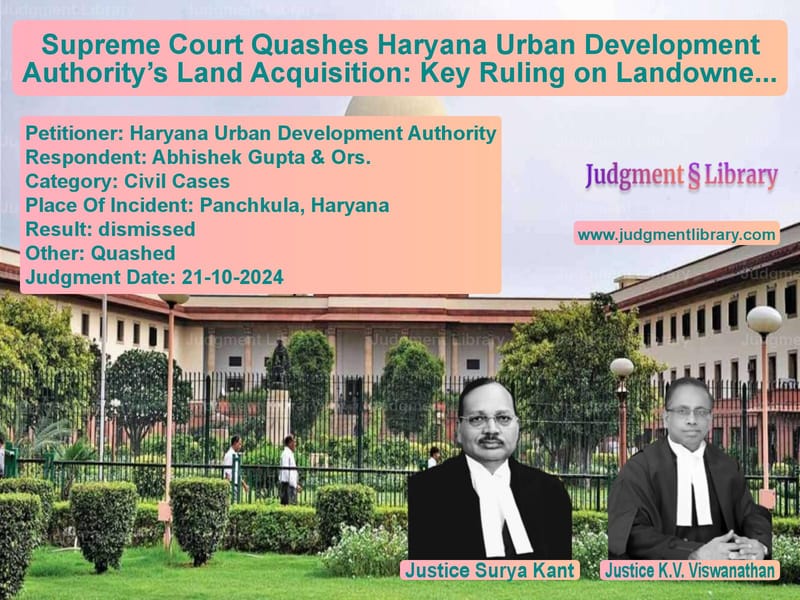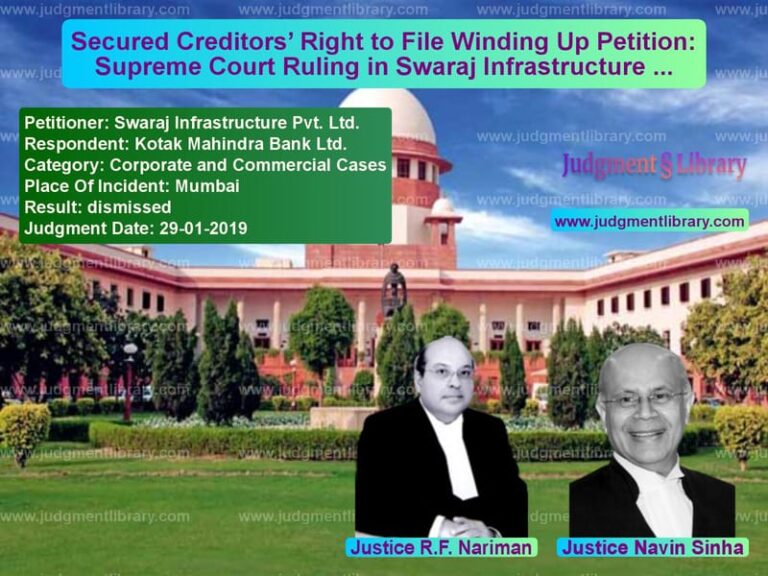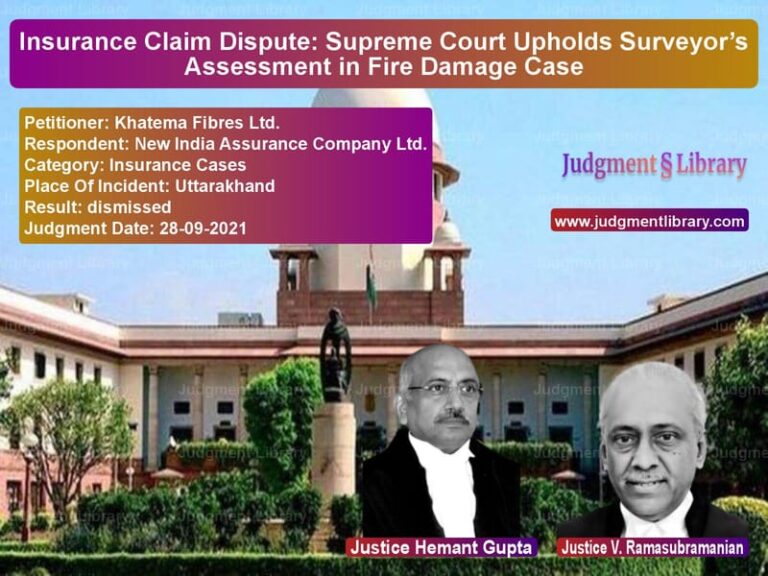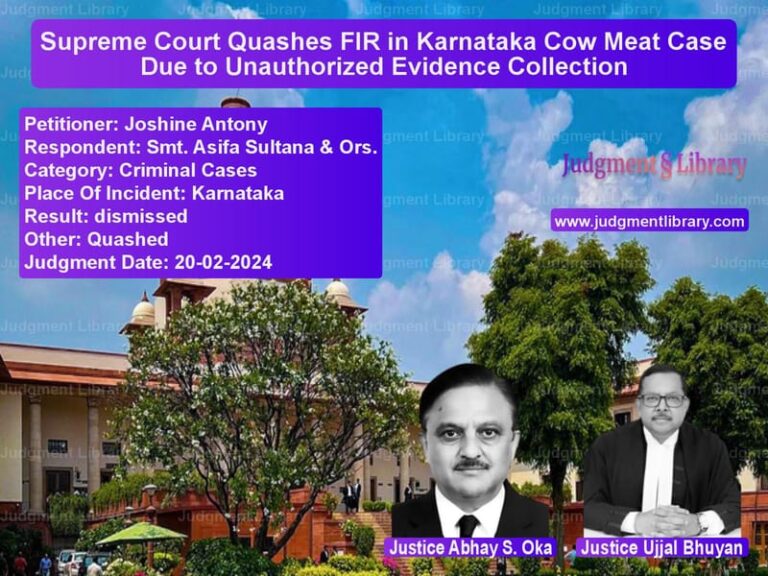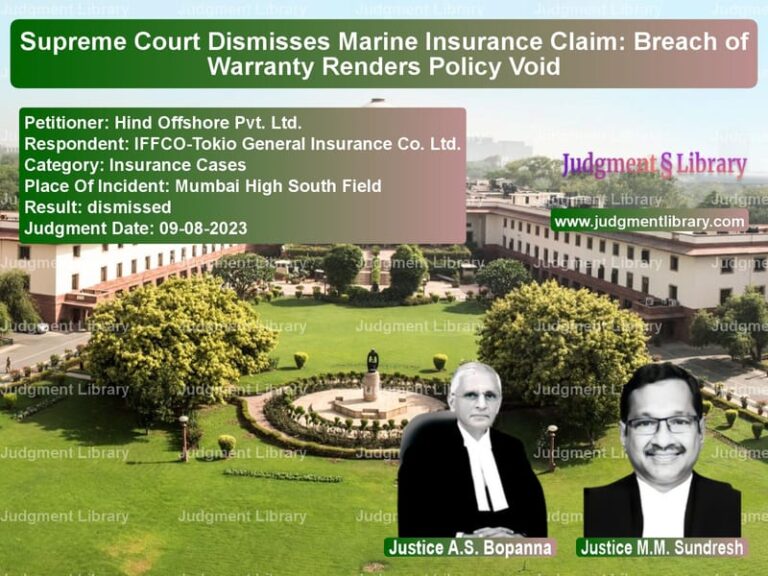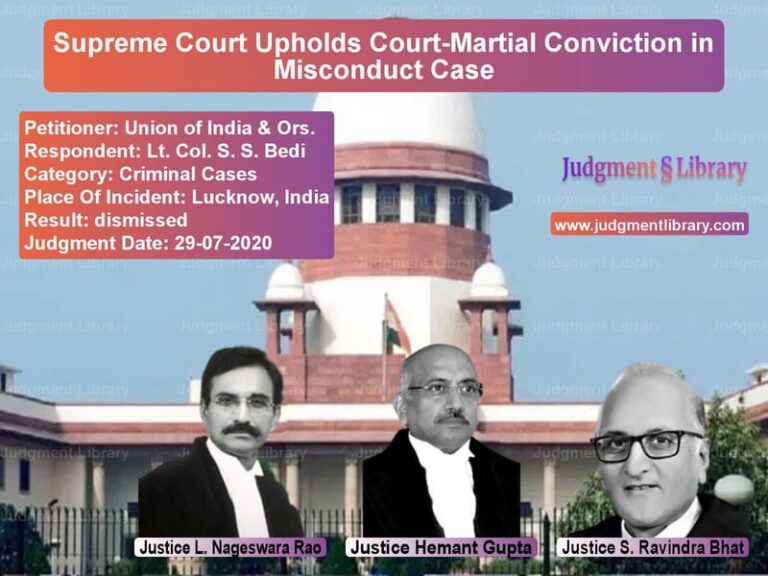Supreme Court Quashes Haryana Urban Development Authority’s Land Acquisition: Key Ruling on Landowner Rights
The Supreme Court of India has ruled in favor of landowners in a significant judgment, Haryana Urban Development Authority (HUDA) v. Abhishek Gupta & Ors., delivered on October 21, 2024. The Court quashed land acquisition proceedings initiated by the State of Haryana, ruling that the acquisition violated fundamental land rights and the constitutional principle of fairness. The case revolved around the acquisition of land in Panchkula, Haryana, where landowners challenged the acquisition process on grounds of procedural irregularities and discriminatory treatment.
Background of the Case
In 1999, the Haryana government issued a notification under Section 4 of the Land Acquisition Act, 1894, proposing the acquisition of 952.18 acres in Saketri and Bhainsa Tiba villages for the development of residential and commercial infrastructure. However, landowners, including the respondent Abhishek Gupta, contested the acquisition, arguing that their land was exempt from acquisition due to existing legal protections.
The landowners’ objections centered on:
- Authorization granted under the Punjab New Capital (Periphery) Control Act, 1952 for structures built on the land.
- Prior judicial approval from the Additional District Judge, Ambala, for constructing a farmhouse.
- Discriminatory treatment as similar land belonging to Maharaja Harinder Singh ‘Khalaf’ Maharaja Varinder Singh was exempted.
The Punjab and Haryana High Court ruled in favor of the landowners in 2008, quashing the acquisition. The Haryana Urban Development Authority (HUDA) challenged this ruling in the Supreme Court.
Petitioner’s Arguments (HUDA)
HUDA, representing the Haryana government, contended:
- The land acquisition was necessary for urban development.
- The landowners’ constructions were unauthorized, as they failed to submit required building plans.
- The state government had the final authority to decide on land acquisition, overriding the objections accepted by the Collector.
- The prior exemption granted to Maharaja Harinder Singh’s land was subsequently revoked, negating claims of discrimination.
Respondent’s Arguments (Landowners)
The landowners, led by Abhishek Gupta, countered:
- Their land was legally protected and could not be acquired.
- The state government failed to properly consider their objections under Section 5A of the Land Acquisition Act.
- They were subjected to unfair treatment, as other similarly situated landowners were exempt.
- The government’s decision was arbitrary and violated principles of natural justice.
Supreme Court’s Analysis and Judgment
Violation of Section 5A: Right to Be Heard
The Supreme Court ruled that the landowners’ objections were not considered fairly. Section 5A of the Land Acquisition Act mandates a fair hearing before land can be acquired. The Court held:
“Section 5A provides a valuable safeguard to landowners against arbitrary acquisitions. It mandates that the government must genuinely consider objections. In this case, the objections were dismissed summarily, violating the right to due process.”
Discriminatory Treatment and Article 14
The Court found merit in the landowners’ claim of discrimination:
“The records indicate that the government exempted some landowners from acquisition while proceeding against others. This violates Article 14 of the Constitution, which guarantees equality before the law.”
Government’s Improper Exercise of Power
The Court criticized the Haryana government’s approach:
“Land acquisition must be based on reasoned decision-making. The state government cannot override due process by arbitrarily rejecting objections. The failure to provide clear reasons for disregarding the Collector’s recommendation undermines the legitimacy of the acquisition.”
Doctrine of Merger Not Applicable
HUDA argued that a previous Supreme Court ruling had already upheld similar acquisitions, barring further litigation. However, the Court rejected this argument, ruling that each case must be decided on its own merits.
Key Directives from the Supreme Court
The Court issued the following directives:
- The land acquisition notifications under Sections 4 and 6 of the Land Acquisition Act were quashed.
- Any penalties imposed on landowners for resisting acquisition were revoked.
- The Haryana government must return acquired land to its original owners.
- The government must reform its land acquisition procedures to ensure compliance with constitutional safeguards.
Impact of the Judgment
This judgment sets a precedent for land acquisition cases across India. Key takeaways include:
- Strengthening Landowners’ Rights: Governments must ensure fair hearings before acquiring private land.
- Preventing Arbitrary Acquisition: Any acquisition without due process can be challenged in court.
- Ensuring Equal Treatment: The ruling reinforces that similarly placed landowners cannot be treated differently.
- Reforming Land Acquisition Laws: Governments must adhere to legal and constitutional safeguards in acquisition proceedings.
Conclusion
The Supreme Court’s judgment in Haryana Urban Development Authority v. Abhishek Gupta reinforces the rule of law in land acquisition cases. It ensures that landowners are not deprived of their property without due process and fair consideration of objections. The ruling serves as a critical reminder to governments and development authorities that land acquisition must be conducted with transparency, fairness, and adherence to constitutional principles.
Petitioner Name: Haryana Urban Development Authority.Respondent Name: Abhishek Gupta & Ors..Judgment By: Justice Surya Kant, Justice K.V. Viswanathan.Place Of Incident: Panchkula, Haryana.Judgment Date: 21-10-2024.
Don’t miss out on the full details! Download the complete judgment in PDF format below and gain valuable insights instantly!
Download Judgment: haryana-urban-develo-vs-abhishek-gupta-&-ors-supreme-court-of-india-judgment-dated-21-10-2024.pdf
Directly Download Judgment: Directly download this Judgment
See all petitions in Property Disputes
See all petitions in Landlord-Tenant Disputes
See all petitions in Contract Disputes
See all petitions in Damages and Compensation
See all petitions in Specific Performance
See all petitions in Judgment by Surya Kant
See all petitions in Judgment by K.V. Viswanathan
See all petitions in dismissed
See all petitions in Quashed
See all petitions in supreme court of India judgments October 2024
See all petitions in 2024 judgments
See all posts in Civil Cases Category
See all allowed petitions in Civil Cases Category
See all Dismissed petitions in Civil Cases Category
See all partially allowed petitions in Civil Cases Category

